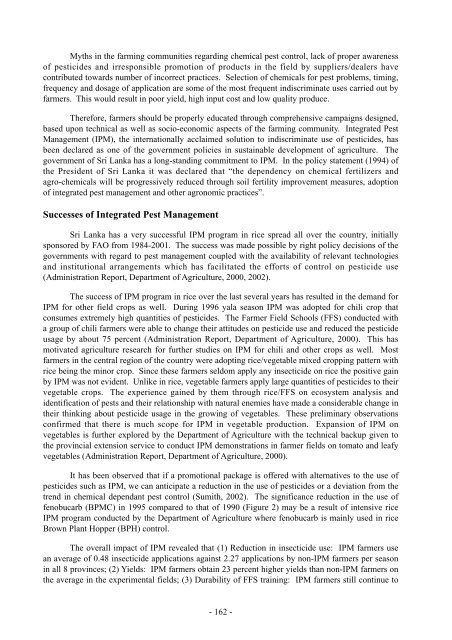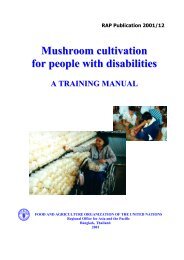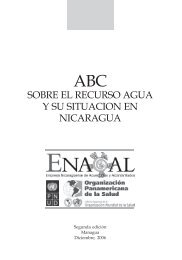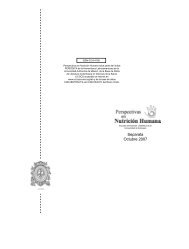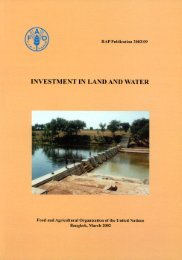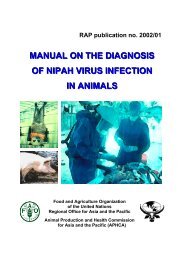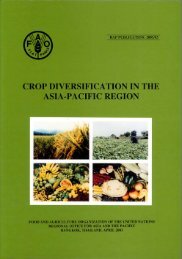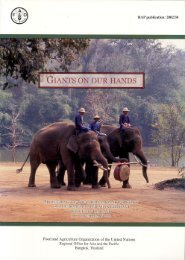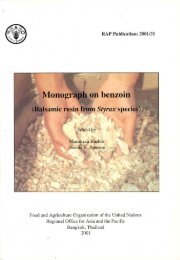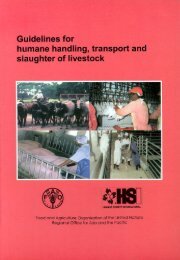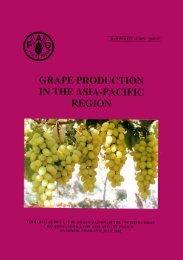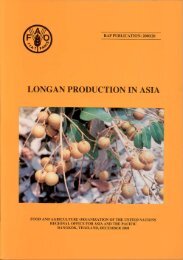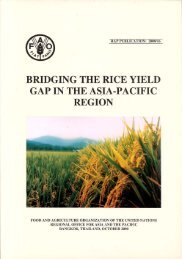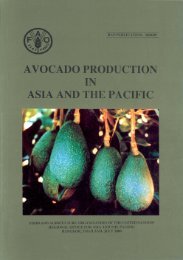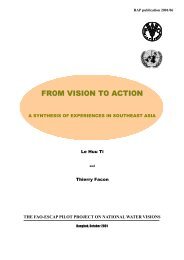Proceedings of the Asia regional workshop on the
Proceedings of the Asia regional workshop on the
Proceedings of the Asia regional workshop on the
Create successful ePaper yourself
Turn your PDF publications into a flip-book with our unique Google optimized e-Paper software.
Myths in <str<strong>on</strong>g>the</str<strong>on</strong>g> farming communities regarding chemical pest c<strong>on</strong>trol, lack <str<strong>on</strong>g>of</str<strong>on</strong>g> proper awareness<br />
<str<strong>on</strong>g>of</str<strong>on</strong>g> pesticides and irresp<strong>on</strong>sible promoti<strong>on</strong> <str<strong>on</strong>g>of</str<strong>on</strong>g> products in <str<strong>on</strong>g>the</str<strong>on</strong>g> field by suppliers/dealers have<br />
c<strong>on</strong>tributed towards number <str<strong>on</strong>g>of</str<strong>on</strong>g> incorrect practices. Selecti<strong>on</strong> <str<strong>on</strong>g>of</str<strong>on</strong>g> chemicals for pest problems, timing,<br />
frequency and dosage <str<strong>on</strong>g>of</str<strong>on</strong>g> applicati<strong>on</strong> are some <str<strong>on</strong>g>of</str<strong>on</strong>g> <str<strong>on</strong>g>the</str<strong>on</strong>g> most frequent indiscriminate uses carried out by<br />
farmers. This would result in poor yield, high input cost and low quality produce.<br />
Therefore, farmers should be properly educated through comprehensive campaigns designed,<br />
based up<strong>on</strong> technical as well as socio-ec<strong>on</strong>omic aspects <str<strong>on</strong>g>of</str<strong>on</strong>g> <str<strong>on</strong>g>the</str<strong>on</strong>g> farming community. Integrated Pest<br />
Management (IPM), <str<strong>on</strong>g>the</str<strong>on</strong>g> internati<strong>on</strong>ally acclaimed soluti<strong>on</strong> to indiscriminate use <str<strong>on</strong>g>of</str<strong>on</strong>g> pesticides, has<br />
been declared as <strong>on</strong>e <str<strong>on</strong>g>of</str<strong>on</strong>g> <str<strong>on</strong>g>the</str<strong>on</strong>g> government policies in sustainable development <str<strong>on</strong>g>of</str<strong>on</strong>g> agriculture. The<br />
government <str<strong>on</strong>g>of</str<strong>on</strong>g> Sri Lanka has a l<strong>on</strong>g-standing commitment to IPM. In <str<strong>on</strong>g>the</str<strong>on</strong>g> policy statement (1994) <str<strong>on</strong>g>of</str<strong>on</strong>g><br />
<str<strong>on</strong>g>the</str<strong>on</strong>g> President <str<strong>on</strong>g>of</str<strong>on</strong>g> Sri Lanka it was declared that “<str<strong>on</strong>g>the</str<strong>on</strong>g> dependency <strong>on</strong> chemical fertilizers and<br />
agro-chemicals will be progressively reduced through soil fertility improvement measures, adopti<strong>on</strong><br />
<str<strong>on</strong>g>of</str<strong>on</strong>g> integrated pest management and o<str<strong>on</strong>g>the</str<strong>on</strong>g>r agr<strong>on</strong>omic practices”.<br />
Successes <str<strong>on</strong>g>of</str<strong>on</strong>g> Integrated Pest Management<br />
Sri Lanka has a very successful IPM program in rice spread all over <str<strong>on</strong>g>the</str<strong>on</strong>g> country, initially<br />
sp<strong>on</strong>sored by FAO from 1984-2001. The success was made possible by right policy decisi<strong>on</strong>s <str<strong>on</strong>g>of</str<strong>on</strong>g> <str<strong>on</strong>g>the</str<strong>on</strong>g><br />
governments with regard to pest management coupled with <str<strong>on</strong>g>the</str<strong>on</strong>g> availability <str<strong>on</strong>g>of</str<strong>on</strong>g> relevant technologies<br />
and instituti<strong>on</strong>al arrangements which has facilitated <str<strong>on</strong>g>the</str<strong>on</strong>g> efforts <str<strong>on</strong>g>of</str<strong>on</strong>g> c<strong>on</strong>trol <strong>on</strong> pesticide use<br />
(Administrati<strong>on</strong> Report, Department <str<strong>on</strong>g>of</str<strong>on</strong>g> Agriculture, 2000, 2002).<br />
The success <str<strong>on</strong>g>of</str<strong>on</strong>g> IPM program in rice over <str<strong>on</strong>g>the</str<strong>on</strong>g> last several years has resulted in <str<strong>on</strong>g>the</str<strong>on</strong>g> demand for<br />
IPM for o<str<strong>on</strong>g>the</str<strong>on</strong>g>r field crops as well. During 1996 yala seas<strong>on</strong> IPM was adopted for chili crop that<br />
c<strong>on</strong>sumes extremely high quantities <str<strong>on</strong>g>of</str<strong>on</strong>g> pesticides. The Farmer Field Schools (FFS) c<strong>on</strong>ducted with<br />
a group <str<strong>on</strong>g>of</str<strong>on</strong>g> chili farmers were able to change <str<strong>on</strong>g>the</str<strong>on</strong>g>ir attitudes <strong>on</strong> pesticide use and reduced <str<strong>on</strong>g>the</str<strong>on</strong>g> pesticide<br />
usage by about 75 percent (Administrati<strong>on</strong> Report, Department <str<strong>on</strong>g>of</str<strong>on</strong>g> Agriculture, 2000). This has<br />
motivated agriculture research for fur<str<strong>on</strong>g>the</str<strong>on</strong>g>r studies <strong>on</strong> IPM for chili and o<str<strong>on</strong>g>the</str<strong>on</strong>g>r crops as well. Most<br />
farmers in <str<strong>on</strong>g>the</str<strong>on</strong>g> central regi<strong>on</strong> <str<strong>on</strong>g>of</str<strong>on</strong>g> <str<strong>on</strong>g>the</str<strong>on</strong>g> country were adopting rice/vegetable mixed cropping pattern with<br />
rice being <str<strong>on</strong>g>the</str<strong>on</strong>g> minor crop. Since <str<strong>on</strong>g>the</str<strong>on</strong>g>se farmers seldom apply any insecticide <strong>on</strong> rice <str<strong>on</strong>g>the</str<strong>on</strong>g> positive gain<br />
by IPM was not evident. Unlike in rice, vegetable farmers apply large quantities <str<strong>on</strong>g>of</str<strong>on</strong>g> pesticides to <str<strong>on</strong>g>the</str<strong>on</strong>g>ir<br />
vegetable crops. The experience gained by <str<strong>on</strong>g>the</str<strong>on</strong>g>m through rice/FFS <strong>on</strong> ecosystem analysis and<br />
identificati<strong>on</strong> <str<strong>on</strong>g>of</str<strong>on</strong>g> pests and <str<strong>on</strong>g>the</str<strong>on</strong>g>ir relati<strong>on</strong>ship with natural enemies have made a c<strong>on</strong>siderable change in<br />
<str<strong>on</strong>g>the</str<strong>on</strong>g>ir thinking about pesticide usage in <str<strong>on</strong>g>the</str<strong>on</strong>g> growing <str<strong>on</strong>g>of</str<strong>on</strong>g> vegetables. These preliminary observati<strong>on</strong>s<br />
c<strong>on</strong>firmed that <str<strong>on</strong>g>the</str<strong>on</strong>g>re is much scope for IPM in vegetable producti<strong>on</strong>. Expansi<strong>on</strong> <str<strong>on</strong>g>of</str<strong>on</strong>g> IPM <strong>on</strong><br />
vegetables is fur<str<strong>on</strong>g>the</str<strong>on</strong>g>r explored by <str<strong>on</strong>g>the</str<strong>on</strong>g> Department <str<strong>on</strong>g>of</str<strong>on</strong>g> Agriculture with <str<strong>on</strong>g>the</str<strong>on</strong>g> technical backup given to<br />
<str<strong>on</strong>g>the</str<strong>on</strong>g> provincial extensi<strong>on</strong> service to c<strong>on</strong>duct IPM dem<strong>on</strong>strati<strong>on</strong>s in farmer fields <strong>on</strong> tomato and leafy<br />
vegetables (Administrati<strong>on</strong> Report, Department <str<strong>on</strong>g>of</str<strong>on</strong>g> Agriculture, 2000).<br />
It has been observed that if a promoti<strong>on</strong>al package is <str<strong>on</strong>g>of</str<strong>on</strong>g>fered with alternatives to <str<strong>on</strong>g>the</str<strong>on</strong>g> use <str<strong>on</strong>g>of</str<strong>on</strong>g><br />
pesticides such as IPM, we can anticipate a reducti<strong>on</strong> in <str<strong>on</strong>g>the</str<strong>on</strong>g> use <str<strong>on</strong>g>of</str<strong>on</strong>g> pesticides or a deviati<strong>on</strong> from <str<strong>on</strong>g>the</str<strong>on</strong>g><br />
trend in chemical dependant pest c<strong>on</strong>trol (Sumith, 2002). The significance reducti<strong>on</strong> in <str<strong>on</strong>g>the</str<strong>on</strong>g> use <str<strong>on</strong>g>of</str<strong>on</strong>g><br />
fenobucarb (BPMC) in 1995 compared to that <str<strong>on</strong>g>of</str<strong>on</strong>g> 1990 (Figure 2) may be a result <str<strong>on</strong>g>of</str<strong>on</strong>g> intensive rice<br />
IPM program c<strong>on</strong>ducted by <str<strong>on</strong>g>the</str<strong>on</strong>g> Department <str<strong>on</strong>g>of</str<strong>on</strong>g> Agriculture where fenobucarb is mainly used in rice<br />
Brown Plant Hopper (BPH) c<strong>on</strong>trol.<br />
The overall impact <str<strong>on</strong>g>of</str<strong>on</strong>g> IPM revealed that (1) Reducti<strong>on</strong> in insecticide use: IPM farmers use<br />
an average <str<strong>on</strong>g>of</str<strong>on</strong>g> 0.48 insecticide applicati<strong>on</strong>s against 2.27 applicati<strong>on</strong>s by n<strong>on</strong>-IPM farmers per seas<strong>on</strong><br />
in all 8 provinces; (2) Yields: IPM farmers obtain 23 percent higher yields than n<strong>on</strong>-IPM farmers <strong>on</strong><br />
<str<strong>on</strong>g>the</str<strong>on</strong>g> average in <str<strong>on</strong>g>the</str<strong>on</strong>g> experimental fields; (3) Durability <str<strong>on</strong>g>of</str<strong>on</strong>g> FFS training: IPM farmers still c<strong>on</strong>tinue to<br />
- 162 -


